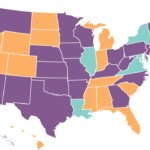Empowering Patients to Act
With new knowledge gleaned from a state’s individual grade, the ultimate goal of the report card is to give all Americans the knowledge to speak out about the challenges people living with rheumatic diseases face, in terms of the direct medical care they are receiving and the broader impact to care caused by barriers on a national scale, such as care access and affordability, Dr. Weselman explains.
She notes two key factors underlying most states’ mediocre grades:
- Poor access: These grades were the result of high rates of residents without health insurance, a severe shortage of rheumatologists and weak laws limiting insurer practices, such as step therapy.
Example: In Arizona, which received a C in the access category, there is only one practicing rheumatologist for every 139,000 people. Whereas, in Massachusetts, which received an A in the access category, there is one rheumatologist for every 19,000 people—a ratio nearly seven times higher. - Poor affordability: Twenty-six states received an F in the affordability category because they have not enacted legislation to require drug pricing transparency from pharmacy benefit managers nor to limit the use of specialty tiers that can result in patients paying thousands of dollars out of pocket each month.
Inviting Physicians to Speak Out
Certain states have found success with addressing issues of affordability on the legislative front in such areas as biosimilars, fail-first, prior authorization and specialty tiers. Example: In Arkansas, rheumatologists have had a strong voice in supporting laws that regulate insurers’ step therapy requirements.
Along with the report card grades, Dr. Weselman hopes an understanding of the legislative efforts and wins happening across the country at the state and federal levels can inspire rheumatologists to pursue and support similar legislation that can make a difference in promoting a better quality of life for rheumatology patients.
Does Your State Make the Grade?
Share your state’s report card on access to care, and encourage patients and families to share their stories and take action as part of RDAM this September. You can also encourage patients to take the ACR’s new online Pledge to Live Well. Pledge takers will receive a pedometer and wristband to encourage them to stay active.
Carina Stanton is a freelance science journalist in Denver.

